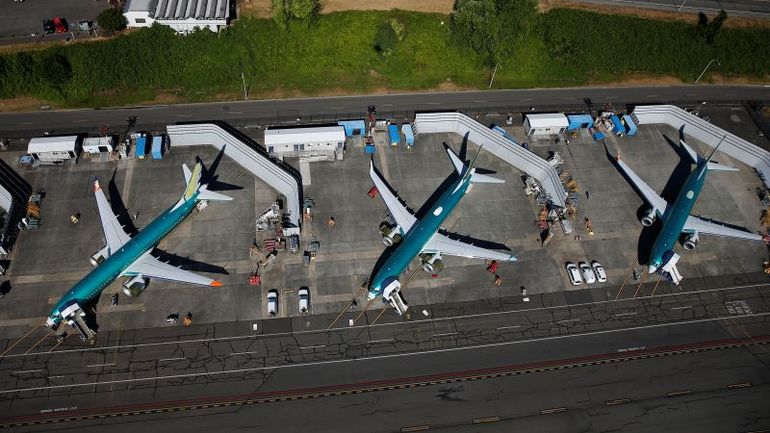
How Boeing's Challenges Might Impact You

Boeing's challenges extend beyond the company itself, potentially affecting the wider US economy and possibly reaching individual consumers.
Boeing's issues don't just affect Boeing. They could also impact your finances and the overall US economy.
One of the largest manufacturers in America is facing significant challenges with production, quality, and safety. These issues escalated recently when a 787 Dreamliner experienced a sudden drop during a flight, causing injuries to many passengers. While it's unclear if Boeing is at fault, this incident adds to the company's already damaged reputation.
Economists predict that Boeing's current crisis may lead to higher airfares and slower economic growth.
Boeing, a major company employing over 140,000 people worldwide, is a key player in the aircraft manufacturing industry alongside Airbus, bringing in billions of dollars in revenue each quarter.
Boeing plays a big role in America's economy. People all over the world depend on their planes for travel, business, deliveries, and creating jobs.
Delays in deliveries are expected due to a federal investigation into Boeing's manufacturing processes. This could mean fewer planes available for Americans, impacting the economy in a negative way.
Boeing's recent mid-flight disasters, like the incident with an Alaska Airlines 737 Max door plug blowing off shortly after takeoff, show that the company needs to address some serious issues.
Boeing has reduced the production of its 737 Max jets due to regulatory scrutiny, resulting in fewer flights being scheduled as airlines anticipate delivery delays. The decline in new orders for durable goods in January, mainly attributed to fewer orders for Boeing jets, dropped by 6.1%.
In February, Boeing only shipped 17 Max jets, half the number shipped in December. Southwest and United Airlines have both announced that they anticipate receiving fewer planes from Boeing than originally planned, leading them to hire fewer pilots.
Fewer jets in operation could result in higher airfares. According to Kathy Bostjancic, chief economist at Nationwide, a decrease in the supply of airplanes means that there will be more demand for flights than the capacity can accommodate. This imbalance leads to an increase in airfares, all other factors remaining constant. As a result, airfares have already seen a significant jump in the past few months, with a 3.6% increase in February.
Boeing's need to address its problems means it probably won't reduce hiring, even if demand for its planes decreases. "I don't think they will cut back on employees when there are serious quality issues. If anything, Boeing might actually increase hiring to improve quality," said José Torres, a senior economist at Interactive Brokers, in an interview with CNN.
Higher labor costs could result in Boeing losing more money, which would further worsen the company's financial situation and negatively impact its stock price. This could potentially lead to a deeper financial hole for Boeing.
On the other hand, weaker US economic growth could potentially benefit Airbus, creating a positive scenario for the competitor in the aerospace industry.
When regulators thought Boeing would stop making the 737 Max jet in January 2020 due to two deadly accidents in 2019 and the grounding of the jets, the New York Fed predicted that this could reduce the US gross domestic product by 0.4% in 2020. (However, Boeing kept producing the 737 Max during this time).
Unfortunately, the situation worsened for Boeing when the pandemic hit, causing the company to suffer losses of nearly $12 billion that year.
The New York Fed analysis pointed out that Boeing plays a major role in the domestic production network and is a significant firm. Production stoppages at Boeing can have a big impact on the overall economy.
Boeing is the largest exporter in the United States. If there is a decrease in demand for Boeing planes, it would result in fewer exports. This could affect GDP growth if exports are lower than imports, which is known as "net exports."
Boeing has not confirmed that it will completely stop making any of its planes. However, it has paused its efforts to increase production of the 737 Max while the Federal Aviation Administration waits for Boeing to address its ongoing quality problems. As a result of Boeing's long-standing issues, Airbus, its French competitor, has surpassed Boeing to become the largest aircraft manufacturer in the world.
It can be challenging for airlines to quickly change manufacturers, but the current trend seems to be favoring Airbus. If US airlines start importing more Airbus planes due to lower demand for Boeing aircraft, this could have an impact on America's GDP.
Lisa Simon, the chief economist at Revelio Labs, pointed out that the decrease in demand for Boeing planes could potentially benefit Airbus instead of simply disappearing.
She added that “this whole fiasco absolutely will likely have adverse effects on the aircraft manufacturing sector in the US” and that it would be “good for the European market.”
Editor's P/S:
Boeing's recent struggles have become a source of concern not only for the company itself but also for the wider economy. The company's production, quality, and safety issues have cast a shadow over its reputation, leading to a potential reduction in new orders and a decline in its stock price. This crisis has the potential to ripple through the aviation industry and beyond, impacting airlines, their customers, and the overall health of the US economy.
The potential consequences of Boeing's problems are far-reaching. Reduced production of its 737 Max jets due to regulatory scrutiny could result in fewer flights, higher airfares, and fewer jobs. Moreover, weakened US economic growth could benefit Boeing's European competitor, Airbus, creating a positive scenario for the latter in the aerospace industry. The situation is also likely to have an impact on Boeing's role as the largest exporter in the United States, potentially affecting GDP growth. the workforce.













